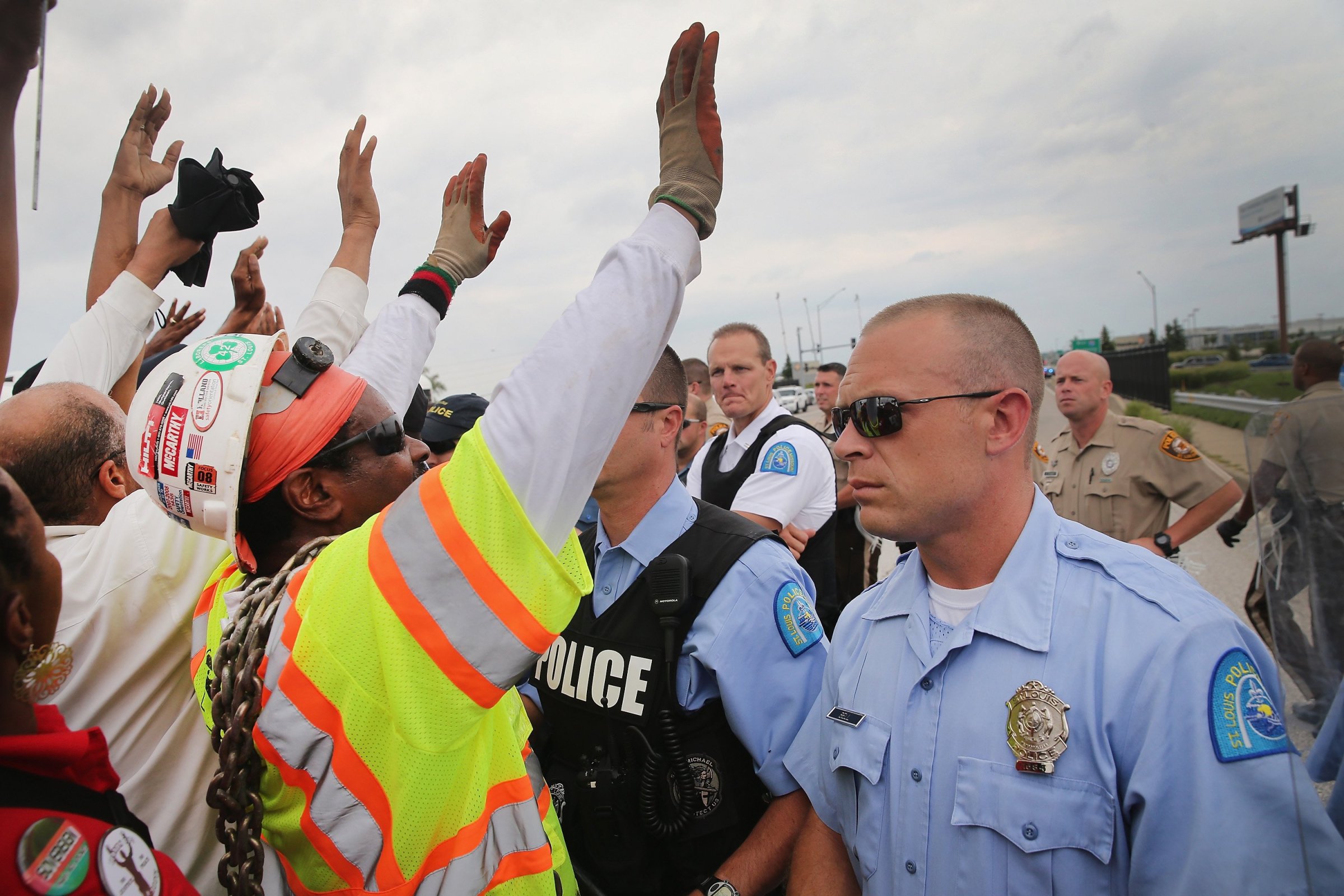
Officer Darren Wilson testified this week in the grand jury investigation into his shooting of Michael Brown, according to the St. Louis Post-Dispatch. The newspaper’s scoop was unusual. Unlike most criminal-justice proceedings in the U.S., grand juries are highly secretive. Leaking information about them is a criminal act.
But perhaps it should no longer be surprising to see the investigation take an interesting turn. More than a month after Brown’s death in Ferguson, Mo., the grand jury appears to be nowhere near a decision on whether Wilson should be charged. And the road to justice has been paved with strange decisions.
Several elements of the grand jury’s proceedings have been uncommon, according to legal experts surveyed by TIME. None of these decisions are necessarily improper. But together they have raised eyebrows. “This is not your regular St. Louis grand jury case,” says Susan McGraugh, a veteran Missouri criminal-defense attorney and law professor at St. Louis University.
The investigation has been fraught from the start. Residents of Ferguson, who have massed in protests each day since Brown was killed on Aug. 9, immediately cast doubt on the impartiality of McCulloch, who has been the county’s elected prosecuting attorney since 1991. McCulloch’s father, a police officer, was killed in the line of duty by a black suspect. Critics have pointed to his record of charging police-involved shootings and suggested that his background may cloud his judgment in the case. There were early murmurs that McCulloch would recuse himself or be replaced by Missouri Gov. Jay Nixon. Instead, McCulloch has delegated the task of presenting evidence to two senior attorneys in his office.
The first unusual decision taken by the prosecutor’s office, experts say, was not to recommend a specific charge for Wilson. Instead, the prosecutors are presenting evidence as it becomes available, and leaving it up to the grand jury to decide what the evidence warrants.
To some members of the community, the decision was taken as a sign that McCulloch may be trying to avoid an indictment. “To present a case to a grand jury, without any direction or instructions with regard to what you want them to achieve,” says Adolphus Pruitt of the St. Louis NAACP, “gives the best odds that an indictment will not occur.”
McCulloch has ordered that all testimony in the case be transcribed. This is rare, because it can be used against witnesses in future legal proceedings. In addition, McCulloch has pledged to immediately release full transcripts and audio recordings of the panel’s testimony in the absence of an indictment. This too is highly unusual.
The prosecutor’s office, which did not respond to an interview request from TIME, has said these decisions were designed with transparency and openness in mind. But they may also be a way to head off criticism. “It will take the heat off McCulloch if the grand jury comes back with something that the public doesn’t like,” says McGraugh.
Without a charging recommendation, the grand jury has the option to indict Wilson on either first- or second-degree murder, or either voluntary or involuntary manslaughter. “If they return an indictment for either murder or manslaughter, no one’s going to care that he didn’t have a charging recommendation,” says Jens David Ohlin, a professor at Cornell Law School. “If, on the other hand, they don’t return an indictment, he can deflect any criticism and say I presented all the evidence to the grand jury, and in their wisdom they decided.”
There is a greater chance that the jury declines to return an indictment than the public may expect, Ohlin says. “It’s a very difficult case.”
With three blacks and nine whites, the grand jury’s composition reflects the demographic makeup of the county, which is roughly one-quarter black. It was empaneled before Brown was shot, and began hearing evidence shortly after. The proceedings could prove unusually lengthy. Authorities originally suggested they expected a decision on whether to charge Wilson by mid-October. But a circuit judge recently extended the panel’s term, giving them until Jan. 7 to decide whether to charge the officer in connection with Brown’s death.
The case is complex, and justice is often slow. But within the community, there are suspicions that the protracted proceedings are a way to drag out the case until the anger on the streets fades—and, perhaps, to gain the benefit of winter weather that might deter protesters.
It won’t work, warns Pruitt of the NAACP. “If there’s no true bill,” he says, “as a community, we are going to be thrust right back into the same discontent and civil disobedience we experienced the first time around.”
More Must-Reads from TIME
- Cybersecurity Experts Are Sounding the Alarm on DOGE
- Meet the 2025 Women of the Year
- The Harsh Truth About Disability Inclusion
- Why Do More Young Adults Have Cancer?
- Colman Domingo Leads With Radical Love
- How to Get Better at Doing Things Alone
- Michelle Zauner Stares Down the Darkness
Write to Alex Altman at alex_altman@timemagazine.com